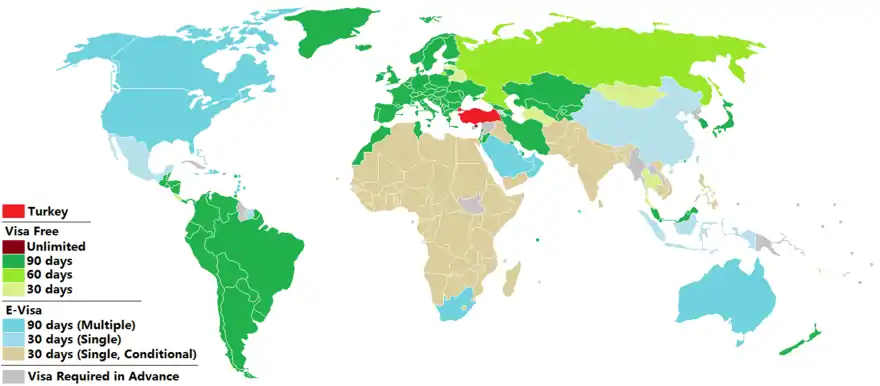Visa policy of Turkey
The visa policy of Turkey deals with the requirements which a foreign national wishing to enter Turkey must meet to be permitted to travel to, enter and remain in the country.[1]
 |
|---|
| This article is part of a series on the politics and government of Turkey |
|
|
Visitors to Turkey must obtain a visa from one of the Turkish diplomatic missions unless they come from one of the 78 visa-exempt countries and territories or one of the 42 countries and territories whose citizens are eligible to apply for an e-Visa online. Turkish visas are documents issued by the Ministry of Foreign Affairs and its subsequent diplomatic missions abroad with the stated goal of regulating and facilitating migratory flows.[2][3]
Visitors of most nationalities must hold a passport valid for no less than 150 days from the date of arrival. The passport validity requirement does not apply to citizens of Belgium, France, Luxembourg, Portugal, Spain and Switzerland who can enter with a passport expired for less than five years, citizens of Germany who can enter with a passport or an ID card expired for less than one year, citizens of Bulgaria who are only required to have a passport valid for their period of stay.[4] An identity card is accepted in lieu of a passport for citizens of Azerbaijan, Belgium, France, Georgia, Germany, Greece, Italy, Liechtenstein, Luxembourg, Malta, Moldova, Netherlands, Northern Cyprus, Portugal, Spain, Switzerland and Ukraine. The validity period requirement also does not apply to nationals of countries whose identity cards are accepted.[5]
Even though Turkey is a candidate country for membership of the European Union, it has a more complex visa policy than the visa policy of the Schengen Area.[2] Turkey requires visas from citizens of one EU member state Cyprus, as well as Schengen Annex II countries and territories – Antigua and Barbuda, Australia, Bahamas, Barbados, Canada, Dominica, East Timor, Grenada, Kiribati, Marshall Islands, Mauritius, Mexico, Micronesia, Palau, Saint Lucia, Saint Vincent and the Grenadines, Samoa, Solomon Islands, Taiwan, Tonga, Tuvalu, United Arab Emirates, United States, and Vanuatu. On the other hand, Turkey grants visa-free access to citizens of other countries and territories – Azerbaijan, Belarus, Belize, Bolivia, Ecuador, Iran, Kosovo, Kyrgyzstan, Jordan, Lebanon, Mongolia, Morocco, Qatar, Russia, Tajikistan, Thailand, Tunisia, Turkmenistan and Uzbekistan.
The Turkish government announced that effective from 2 March 2020, visas are not required for passport holders from the following countries: Austria, Belgium, Croatia, Republic of Ireland, Malta, Netherlands, Norway, Poland, Portugal, Spain and the United Kingdom.[6]
Visa policy map

As of right
Citizens of the following countries or territories have the right to enter, reside, study, and work indefinitely in Turkey without any immigration restrictions:
Visa-free
Citizens of the following countries and territories do not require a visa to visit Turkey for the durations described below for tourism or business purposes (unless otherwise stated). For visits of up to 90 days within a 180-day period, an identity card is accepted in lieu of a passport for citizens of some countries.[2]
ID – May enter with an ID card for a stay of up to 90 days per 180-day period |
Visa is also not required for holders of a "Laissez-Passer" issued by the United Nations.[2]
The visa-free regime also applies to the citizens of the following countries under certain conditions:[2]
 Algeria – provided being under 15 or above 65 for a maximum stay of 90 days within 180 days
Algeria – provided being under 15 or above 65 for a maximum stay of 90 days within 180 days Cyprus – provided residing in Northern Cyprus and directly arriving from Ercan International Airport or seaports of Famagusta, Kyrenia, or Karavostassi for a maximum stay of 90 days within 180 days[1]
Cyprus – provided residing in Northern Cyprus and directly arriving from Ercan International Airport or seaports of Famagusta, Kyrenia, or Karavostassi for a maximum stay of 90 days within 180 days[1] Libya – provided being under the age of 16 and above the age of 55, for a maximum stay of 90 days within any 180 days period.
Libya – provided being under the age of 16 and above the age of 55, for a maximum stay of 90 days within any 180 days period. Palestine – provided holding a VIP passport
Palestine – provided holding a VIP passport
Diplomatic and service category passports
Citizens of Algeria, Austria, Azerbaijan, Bahamas, Bahrain, Bangladesh, Barbados, Belgium, Bulgaria (30 days), Cambodia (30 days), China, Côte d'Ivoire, Croatia, Cuba, Djibouti, Egypt, Grenada, Guyana, Indonesia, Iraq, Israel, Jamaica, Kenya, Latvia, Libya (tourism purpose only), Maldives (30 days), Malta, Mauritania, Mauritius, Mozambique, Namibia, Netherlands, Norway, Oman, Pakistan, Philippines, Poland, Portugal (tourism purpose only), Spain, Saint Lucia, Saint Vincent and the Grenadines, Saudi Arabia (tourism purpose only), Sierra Leone,[15] South Africa (30 days), Spain, Tanzania, Thailand, United Arab Emirates, Vietnam and Yemen (30 days) and for holders of diplomatic passports of Afghanistan, Benin, Burkina Faso, Burundi, Republic of the Congo, Ethiopia, Fiji, Gabon, Gambia, Guinea, India, Liberia, Mali, Mexico, Niger, Nigeria, Palestine, Russia, Senegal, South Sudan (tourism purpose only), Sudan (tourism purpose only), Togo,[16] Uganda and United Kingdom – provided holding diplomatic, service and special passports for a maximum stay of 90 days within 180 days
Visa waiver agreements for diplomatic passports were signed with Laos in November 2018 and with Zambia in May 2019 and they are yet to come into force.[17][18][19]
e-Visa
Holders of passports of the following 29 countries and territories can obtain e-Visas online for a fee prior to arrival. The duration of stay for most of these nationalities is 90 days (30 days for some) within 180 days.[20][21]
ID – May enter with an ID card for a stay of up to 90 days per 180-day period
1 – May only apply for a single entry e-visa on which they can stay for up to 30 days.
2 – Allowed to enter with an expired passport (up to 5 years)
3 – e-Visas are issued free of charge. Fees apply to Mexican citizens who obtain e-Visas on arrival.
4 – Not eligible for e-visas on arrival.
5 – May apply for a multiple entry e-visa on which they can stay for up to 30 days.
Conditional e-Visa
Citizens of these countries and territories are eligible to apply for a single entry e-Visa on which they can stay for up to 30 days only if meeting the conditions listed below:[20][2]
1 – e-Visas are issued free of charge.
Conditions:
- All nationalities, except for citizens of Gabon and Zambia, must hold a valid visa or residence permit from one of the following countries: Schengen area countries, Ireland, the United Kingdom or the United States. Electronic visas or e-residence permits are not accepted. Egyptian citizens who are under 20 or over 45 years old do not need to fulfill this requirement.
- All citizens except for the citizens of Afghanistan, Bangladesh, India, Pakistan and Philippines must travel with one of the airlines that has protocols with Turkish Ministry of Foreign Affairs. The following airlines meet the criteria: Onur Air, Pegasus Airlines and Turkish Airlines.[23] Citizens of Egypt may also travel on flights operated by EgyptAir.
- Must hold a hotel reservation and adequate financial means (US$50 per day).
- Algerian citizens must be aged below 18 or over 35 years old to be eligible for e-Visa. Otherwise, a sticker visa is required.
- Afghanistan, Iraq, Zambia and Philippines citizens not eligible for e-visa on arrival at Istanbul Airport
Visa on arrival only under limited circumstances
Citizens of ![]() North Korea may only obtain a visa on arrival for a stay of max 30 days if holding a valid visa or residence permit issued by Schengen area countries, Ireland or the United Kingdom.[2]
North Korea may only obtain a visa on arrival for a stay of max 30 days if holding a valid visa or residence permit issued by Schengen area countries, Ireland or the United Kingdom.[2]
Sticker visa required
Citizens of the following countries and territories must obtain a sticker-type visa in advance at one of the Turkish diplomatic missions:[2][1]
|
Visitor statistics
Most tourist arrivals in Turkey are from the following countries of nationality.[24][25][26][27][28]
| Rank | Country | 2019 | 2018 | 2017 | 2016 | 2015 |
|---|---|---|---|---|---|---|
| 1 | 3,649,003 | |||||
| 2 | 5,580,792 | |||||
| 3 | 1,821,480 | |||||
| 4 | 2,512,139 | |||||
| 5 | 1,700,385 | |||||
| 6 | 1,911,832 | |||||
| 7 | 706,551 | |||||
| 8 | 1,094,144 | |||||
| 9 | 1,232,487 | |||||
| 10 | 602,488 | |||||
| 11 | 550,779 | |||||
| 12 | 847,259 | |||||
| 13 | 755,414 | |||||
| 14 | 441,097 | |||||
| 15 | 798,787 | |||||
| 16 | 224,568 | |||||
| 17 | 450,674 | |||||
| 18 | 617,406 | |||||
| 19 | 162,866 | |||||
| 20 | 423,744 | |||||
| 21 | 624,649 | |||||
| 22 | 313,704 | |||||
| 23 | 486,044 | |||||
| 24 | 507,897 | |||||
| 25 | 197,552 | |||||
| 26 | 174,486 | |||||
| 27 | 408,841 | |||||
| 28 | 212,464 | |||||
| 29 | 380,338 | |||||
| 30 | 174,330 | |||||
| 31 | 171,873 | |||||
| 32 | 178,997 | |||||
| 33 | 246,245 | |||||
| 34 | 234,762 | |||||
| 35 | 204,355 | |||||
| 36 | 236,063 | |||||
| 37 | 143,331 | |||||
| 38 | 109,775 | |||||
| 39 | 131,869 | |||||
| 40 | 112,654 | |||||
| Total | 41,114,069 |
Turkey issued 16,199,968 electronic visas between April 2013 and January 1, 2017. Acceptance rate was 87.79% as 18,452,733 applications were filed in this period. Most visas were issued to nationals of the United Kingdom (4.6 million), Iraq (2 million) and the Netherlands (1.8 million).[29]
See also
| Wikivoyage has a travel guide for Turkey. |
References
- "Country information (visa section)". Timatic. International Air Transport Association (IATA) through Olympic Air. Retrieved 1 April 2017.
- "From Rep. of Turkey Ministry of Foreign Affairs". Republic of Turkey Ministry of Foreign Affairs. Retrieved 3 April 2018.
- "Passport Validity Requirements While Entering Turkey in Accordance with Law on Foreigners and International Protection". Turkish MFA.
- "Countries whose citizens are allowed to enter Turkey with their national ID's / Rep. of Turkey Ministry of Foreign Affairs". Mfa.gov.tr. Archived from the original on 2015-10-08. Retrieved 2016-05-04.
- "Türkiye'den 11 ülkeye vize muafiyeti". NTV. 2020-03-02.
- "Turkey grants visa exemptions to 4 more EU nations, plus Norway". Daily Sabah. Retrieved 2021-02-05.
- https://www.resmigazete.gov.tr/eskiler/2021/01/20210130-1.pdf
- "Turkey Azerbaijan agree on Mutual visa exemption". Anadolu Agency. 2020-06-03.
- "Cumhuriyet haber verir... Son dakika haberler ve doğru haberin sitesi". www.cumhuriyet.com.tr (in Turkish). Retrieved 2020-06-04.
- "From Rep. of Turkey Ministry of Foreign Affairs". Republic of Turkey Ministry of Foreign Affairs. Retrieved 3 April 2018.
- "Türkiye'den 6 Avrupa ülkesine vize muafiyeti". NTV. 2020-02-20.
- "Turkey Introduces Visa Regime for Russian Journalists". themoscowtimes.com. Retrieved 3 April 2018.
- "Türki̇ye, Hi̇zmet Pasaportu Hami̇li̇ Rusya... – T.C. Moskova Büyükelçiliği-Посольство Турции Москва-Turkish Embassy Moscow". Facebook. 2016-04-18. Retrieved 2016-05-04.
- "200305-6.pdf" (PDF). 2020.
- https://www.resmigazete.gov.tr/eskiler/2020/11/20201125M2-4.pdf
- "Turkey in Ethiopia on Twitter". twitter.com. Retrieved 3 April 2018.
- Foreign Minister Mevlüt Çavuşoğlu visited Laos, 7–8 November 2018
- [http://www.xinhuanet.com/english/2019-05/08/c_138043756.htm Zambia, Turkey waive visa requirements for diplomatic passport holders]
- "Electronic Visa Application System". Electronic Visa Application System. Retrieved 3 April 2018.
- "Vize Harc Miktarlari En.pdf" (PDF).
- Must be below 18 or over 35 years old.holding valid visa or residence permit issued by Schengen area countries, Ireland or the United Kingdom
- "Electronic Visa Application System". Electronic Visa Application System. Retrieved 3 April 2018.
- Ministry of Culture and Tourism, Republic of Turkey. "Number of Arriving-Departing Foreigners and Citizens, December 2016". Retrieved 16 May 2017.
- NUMBER OF ARRIVING-DEPARTING VISITORS, FOREIGNERS AND CITIZENS December 2017
- "DISTRIBUTION OF ARRIVING FOREIGN VISITORS - TOP 5 COUNTRIES (2016-2018) JANUARY-DECEMBER".
- "Tourism Receipts-Expenditures (2003-2019)".
- https://www.ktb.gov.tr/EN-249306/2019.html
- "Turkey issued over 16 million online visas since 2013". dailysabah.com. Retrieved 3 April 2018.